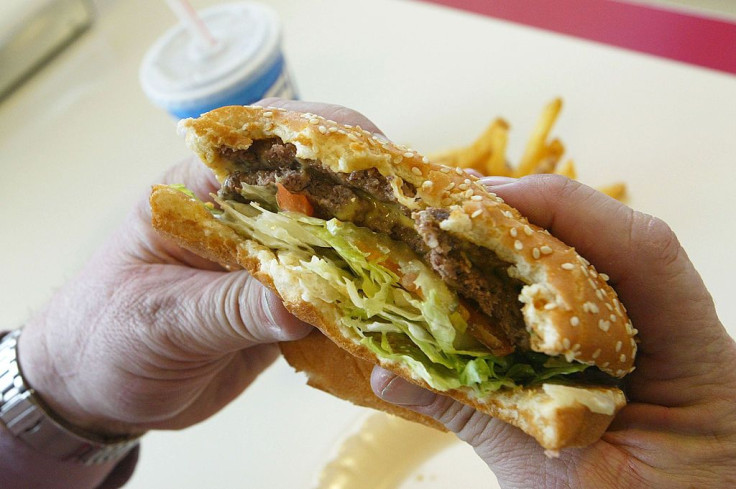Diets With Too Much Red Meat and Too Few Vegetables May Accelerate 'Biological Age'

The hamburger is a delicious part of the western diet. And it seems no matter how many health risks it's associated with, from cancer to Alzheimer’s disease and heart failure, Americans are unwilling to put their beloved sandwich down: They consume an estimated 14 billion burgers each year, The Huffington Post reported. Could new research from the University of Glasgow finally get people to reduce their intake?
The study, published in Aging, suggests overdoing it on red meat could accelerate the body's biological age. Unlike chronological age, which is the number of years a person has lived, some experts suggest biological age is tied closely to a person's risk for age-related diseases such as dementia, Live Science reported. One of the factors that determine biological age is the amount of serum phosphate in the body, particles that increase when people eat meat. According to researchers, even a moderate raise in serum phosphate levels can speed up biological aging, and even more so for men living in poor areas.
For the study, researchers analyzed the eating habits of more than 600 people who lived in either the most or least deprived areas of Glasgow, Scotland. To assess how red meat consumption affected their biological age, researchers measured for serum phosphate and biological age markers, including DNA content and telomere length. Telomeres are end caps on DNA strands that ultimately preserve chromosomes and protect them from deteriorating.
Results showed phosphate levels among men living in the most deprived parts of Glasgow were directly related to how often they ate red meat. Researchers speculate that this excess consumption is due to this group’s limited access to healthy, quality foods; they have more access to meat than they fresh fruits and vegetables. In the U.S., this is often referred to as a food desert.
Researchers also found that high phosphate levels were linked with reduced kidney function and underlying mild to moderate chronic kidney disease.
“The data in this study provides evidence for a mechanistic link between high intake of phosphate and age-related morbidities tied to socio-economic status,” researcher Paul Shiels said in a statement. “Our observations indicate that elevated red meat consumption has adverse effects amongst deprived males, who already have a poor diet and eat less fruit and vegetables than recommended.”
Phosphate is naturally found in many of our everyday foods. They help enhance flavor and moistness in deli meats, cheese, and baked goods. It’s also needed to help cells work properly. However, intestinal absorption isn't regulated, and high supplementation of phosphates via red meat consumption can elevate levels of serum phosphate. At this point, meat eaters face adverse health consequences and even early death.
“Strikingly, many of the subjects had kidney function indicative of incipient or early onset chronic kidney disease,” Shiels said. “It has also not escaped our attention that red meat product quality and preservation may have an impact upon the diets of the most deprived and their associated health.”
Experts on the Meat Advisory Panel criticized the study, calling it an “elementary theory” based on “speculation” and not “solid evidence.” For their part, the researchers did say their study was limited in that it looks at a small sample of people and doesn't differentiate between the type of red meat consumed. They conclude more research needs to be done.
Dietitian Dr. Carrie Ruxton told The Huffington Post that red meat helps support normal health because it’s a valuable source of iron, B vitamins, and vitamin D.
“Dietary phosphate comes from a wide variety of sources...as noted by the authors themselves in the paper. Therefore, using a cross-sectional ‘snapshot’ of diet and blood samples as was the case in this study, it is impossible to say which individual dietary component was responsible for people’s raised blood phosphate levels,” Ruxton said.
Source: McClelland R, Christensen K, Mohammed S, et al. Accelerated Aging and Renal Dysfunction Links Lower Socioeconomic Status and Dietary Phosphate Intake. Aging. 2016.



























